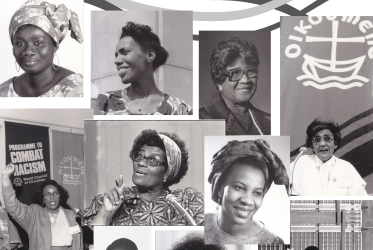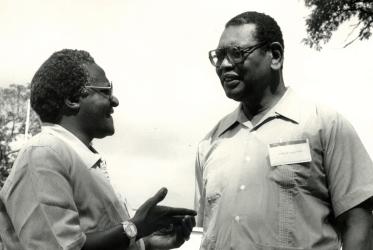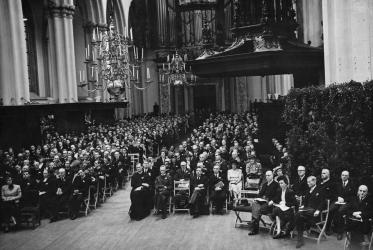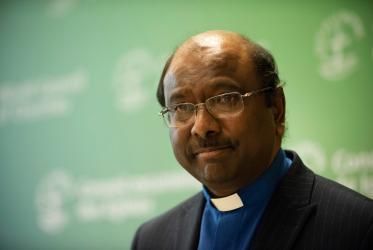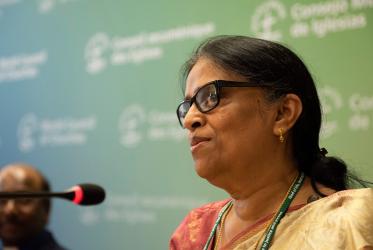from Rev. Dr Samuel Kobia
18 August 2006
On behalf of the World Council of Churches, it is my honour to pay a debt of gratitude to our third General Secretary, the Rev. Dr Philip A. Potter, on the 85th anniversary of his birth. Throughout his career, he has represented all that is most promising in the quest for Christian unity.
Born in Roseau, Dominica in the West Indies on 19 August 1921, Philip Potter became active in the ecumenical movement through student and youth activities of the Caribbean churches. Ecumenical consciousness was unavoidable in the Potter household, headed by a Protestant mother and a Catholic father. Philip recognized the truth of God's good news despite divisions among the churches.
As a young lay pastor and newly ordained minister, Philip took the gospel to the island of Nevis and to Creole-speaking people of rural Haiti; later, he would work on the staff of the Methodist Missionary Society in London. He represented the Jamaica Student Christian Movement at the 1947 world conference on Christian youth in Oslo, Norway. He then served as a spokesperson for youth at the first two assemblies of the World Council of Churches, at Amsterdam (1948) and Evanston (1954). He has continued to be an active participant in every WCC assembly since that time, including our 9th Assembly at Porto Alegre, Brazil in February 2006.
With the passing years, Philip Potter became a mentor as well as a friend to his partners on the ecumenical journey toward unity, justice and peace. He moved to Geneva in 1954 to work in the WCC's youth department, and remained with the WCC until his retirement. In his Geneva years he also chaired the board of the World Student Christian Federation. From 1972 to 1984, he served as the WCC's General Secretary - the first person from the developing world to hold the Council's highest administrative post. Generations of activists within church and society have benefited from Philip's advice and guidance; I gladly attest to this, as I am one of them.
Great strides were taken by the World Council of Churches under Philip Potter's leadership; among the most memorable were the development of the theological consensus document Baptism, Eucharist and Ministry, the continuation of a courageous campaign against apartheid in southern Africa and other forms of racism throughout the world, a vigourous debate on the nature of post-colonial Christian mission, a co-ordinated witness for peace amid East-West tensions and the threat of nuclear annihilation, as well as an exploration of new forms of spirituality, worship and music drawing on the diverse traditions of the churches. Whenever the Council's positions brought controversy, Philip Potter acted as a thoughtful interpreter and bold defender of the WCC and its priorities.
At the time of his retirement, a resolution of the WCC central committee described "the underlying unity in all Dr Potter's efforts" as his commitment to "one ecumenical movement, one fellowship of churches moving together along one pilgrim way, the hope of the one humanity promised by God". For this vision, we give thanks to God - and we extend our gratitude for Philip Potter's life, health and Christian witness.
Samuel Kobia
WCC general secretary
